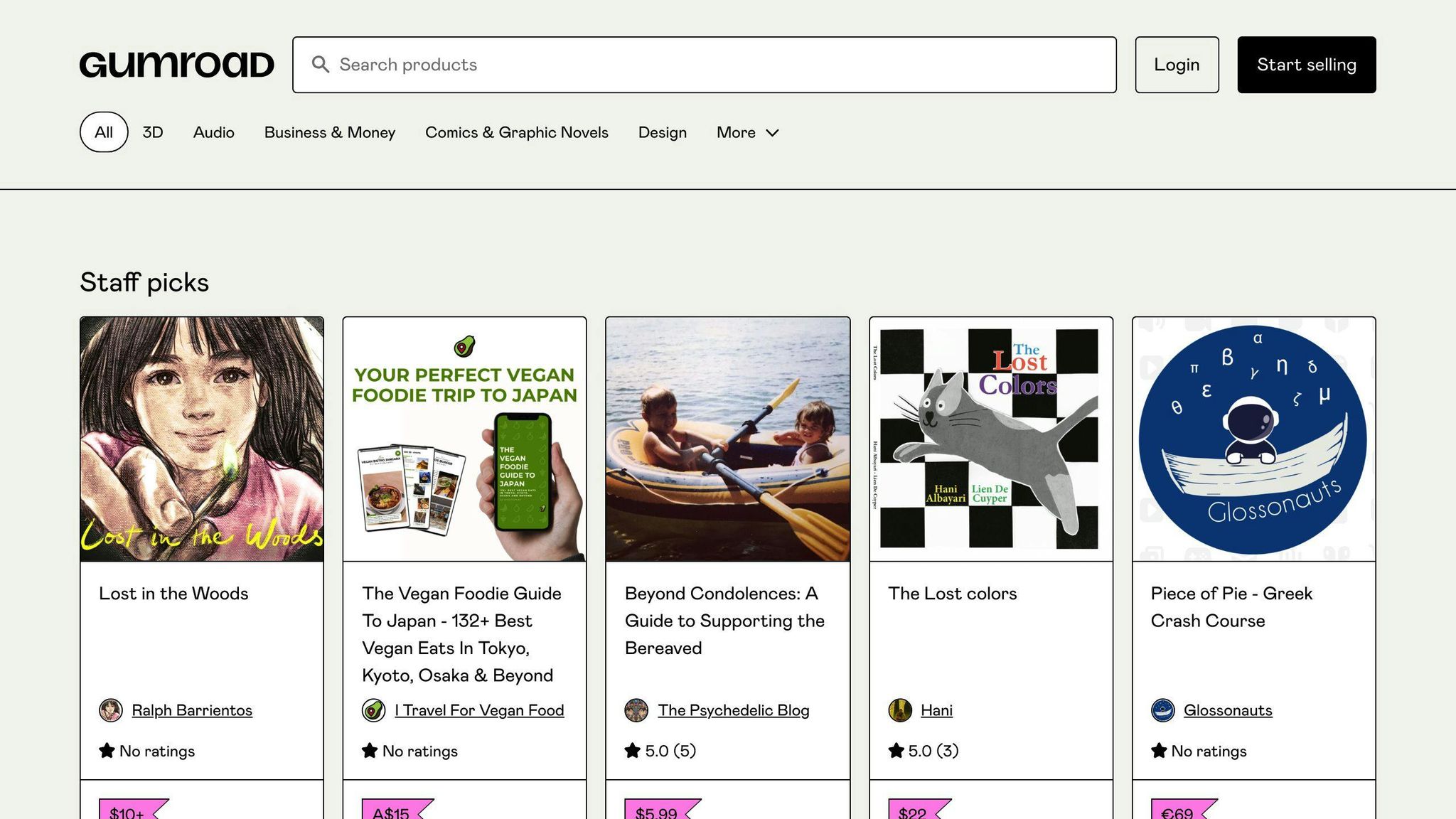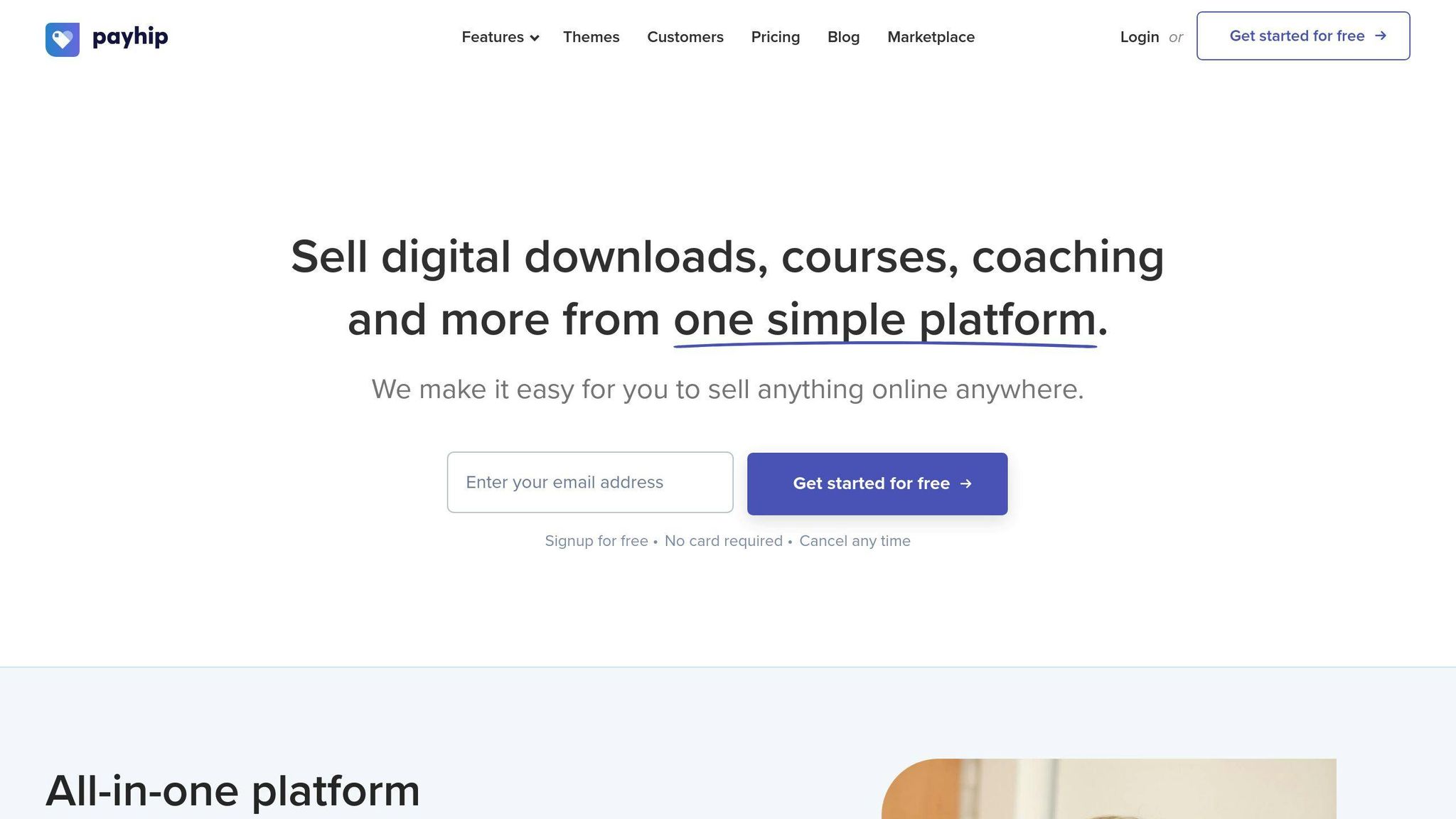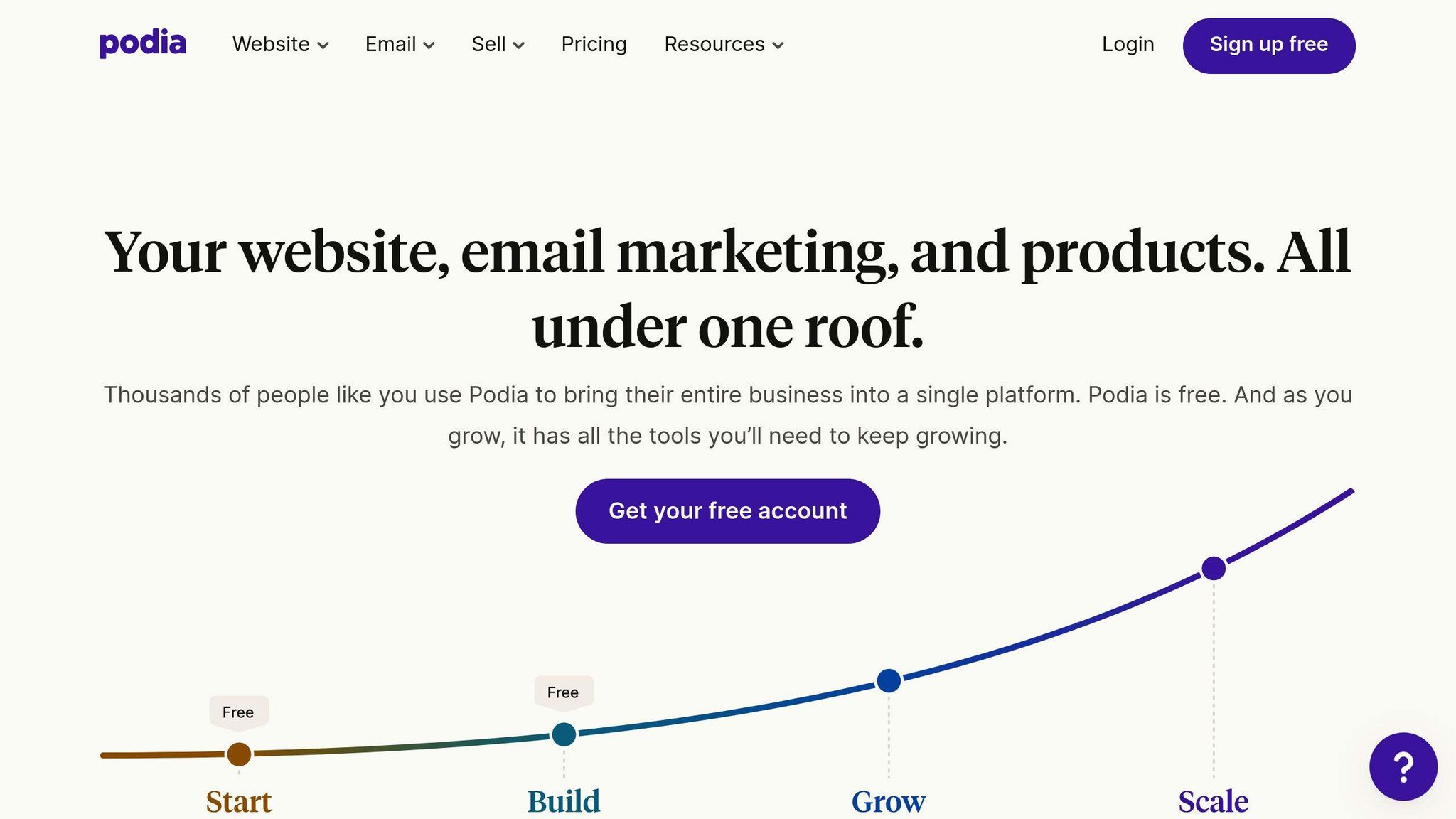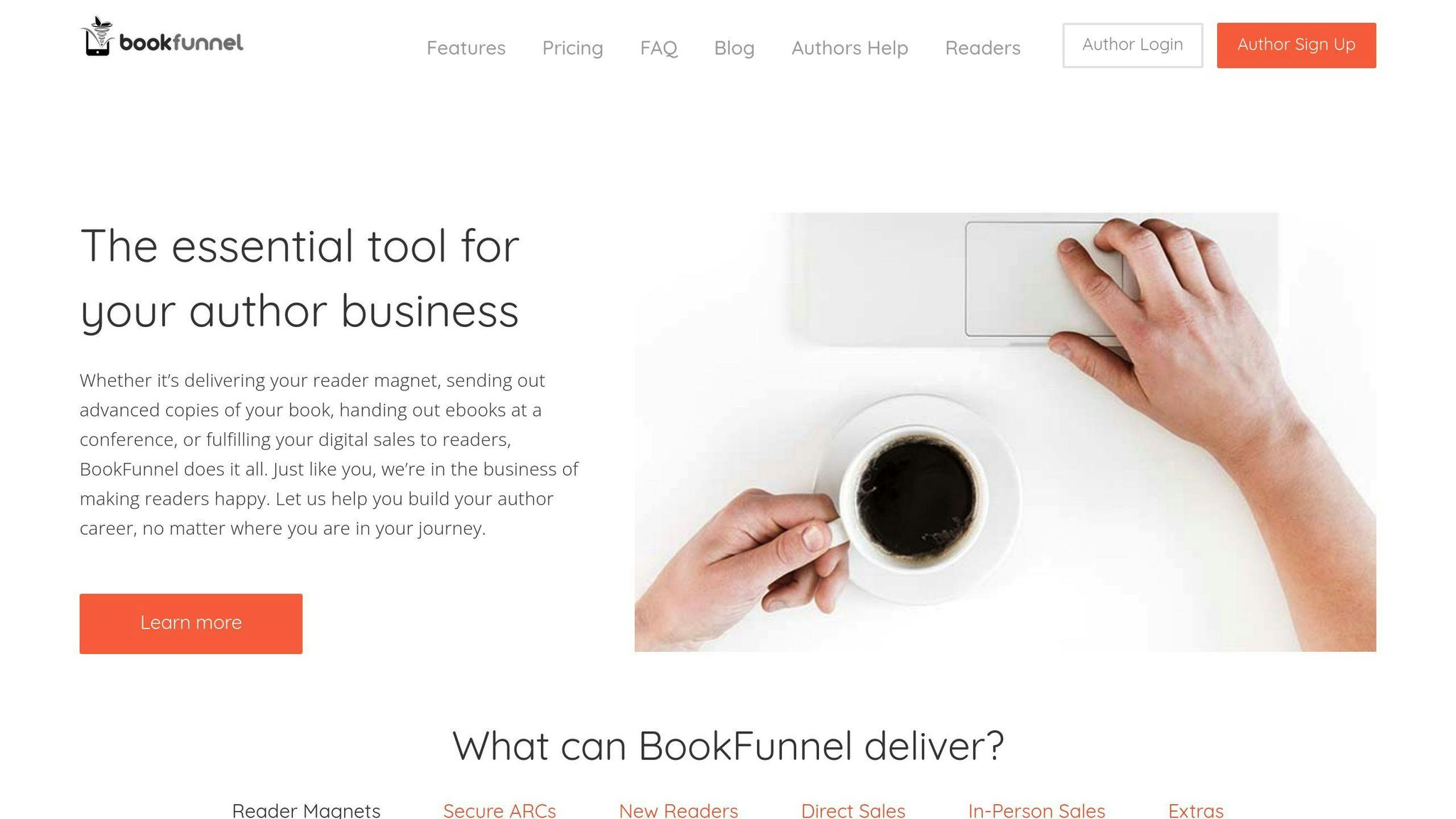Shopify vs. Cutting-Edge Alternatives to Sell eBooks as an Indie Creator
Choosing the right platform to sell your eBooks is crucial for indie creators. Here's a quick comparison of Shopify and its alternatives:
| Platform | Best For | Monthly Cost | Per Sale Fee | Key Features |
|---|---|---|---|---|
| Shopify | Growing businesses | $29-$299 | 2.4-2.9% + $0.30 | Full online store, marketing tools |
| Gumroad | New creators | $0-$10 | 3.5-9% + $0.30 | Simple setup, low upfront cost |
| Payhip | Direct sales | $0-$99 | 0-5% | EU VAT handling, social media selling |
| Podia | Digital product creators | $33+ | No extra fees | Courses, memberships, email marketing |
| BookFunnel | Author-focused | Varies | N/A | Secure eBook delivery, reader support |
Key considerations for choosing a platform:
- Your technical skills and setup time
- Marketing and promotion tools
- Payment processing and fees
- Reader experience and file formats
- Sales tracking and analytics
The best choice depends on your specific needs, budget, and growth plans. Consider trying free trials to find the best fit for your eBook business.
Related video from YouTube
Shopify for eBook Sales

Shopify lets indie creators sell eBooks with many useful tools.
Shopify's eBook Selling Tools
Shopify offers:
- Digital Downloads app for automatic eBook delivery
- Custom product pages
- Safe payment processing
- Auto tax calculation
- Tools to promote eBooks
Good Things About Shopify
Easy to Use
Shopify is simple for most people:
- Clear dashboard to manage products and orders
- Drag-and-drop store builder
- Quick setup for digital products
Ways to Promote
Shopify helps you market your eBooks:
- SEO tools to help people find your store
- Email marketing
- Social media sharing
- Reminders for people who didn't finish buying
Not-So-Good Things About Shopify
Cost
Shopify can be expensive for some creators:
| Plan | Monthly Cost | Fee Per Sale |
|---|---|---|
| Basic | $29 | 2.9% + $0.30 |
| Shopify | $79 | 2.6% + $0.30 |
| Advanced | $299 | 2.4% + $0.30 |
This might be too much for new creators or those with few sales.
Too Much for Just eBooks
If you only sell eBooks, Shopify might have more than you need:
- In-person selling tools you won't use
- Stock tracking that's not needed for eBooks
- Extra features that might make selling harder
Shopify has many tools, but indie creators should think about what they really need and can afford when picking a platform to sell eBooks.
New Platforms for eBook Sales
Let's look at some new options for indie creators to sell eBooks besides Shopify:
Gumroad

Gumroad is a simple platform for selling digital products, including eBooks.
eBook Sales Tools
- Add to your website or link to Gumroad store
- Make your own product pages
- Send eBooks to buyers right away
- Work with email marketing tools
Good and Bad Points
| Good | Bad |
|---|---|
| No monthly fees | 10% fee on each sale |
| Gumroad Discover helps find buyers | Less customization than big platforms |
| Sells other digital products too |
Payhip

Payhip is made for people who create digital products.
eBook Features
- Handles EU VAT for you
- Set up affiliate programs
- Change how checkout works
- Sell on social media
Upsides and Downsides
| Upsides | Downsides |
|---|---|
| Free plan with 5% fee | Fewer big features than larger platforms |
| Easy to use | Fees on cheaper plans |
| Sells courses and memberships too |
Podia

Podia lets you sell digital products and build online groups.
Digital Product Tools
- Store for Books and other digital items
- Make courses and memberships
- Email marketing
- Manage affiliates
Good and Bad for eBooks
| Good | Bad |
|---|---|
| Many tools for digital creators | Starts at $33/month |
| No extra fees on paid plans | Takes time to learn all features |
| Email and community tools included |
BookFunnel

BookFunnel focuses on sending eBooks and keeping readers happy.
eBook Delivery Features
- Safe eBook delivery to many devices
- Make pages for free eBooks and sales
- Works with big online stores
Strong and Weak Points
| Strong | Weak |
|---|---|
| Made for authors and readers | Not a full sales platform |
| Great help for authors and readers | Can be costly for authors with few books |
| Stops people from stealing books |
Each of these platforms has good points for indie creators selling eBooks. Pick the one that fits your needs, budget, and plans for your eBook business.
Platform Comparison
Let's compare the main options for selling eBooks as an indie creator:
Costs
| Platform | Monthly Fee | Fee Per Sale |
|---|---|---|
| Shopify | $29-$299 | 0.5-2% + payment fees |
| Gumroad | $0 or $10 | 3.5-9% + $0.30 |
| Payhip | $0-$99 | 0-5% |
Gumroad is cheapest to start, but takes more per sale. Shopify costs more monthly but less per sale. Think about how many books you'll sell when choosing.
Easy to Use
Shopify
- Simple dashboard
- Drag-and-drop store builder
- Lots of tools in one place
Gumroad
- Quick setup
- Easy product pages
- Works with your website
Both are easy, but Gumroad is simpler if you only sell eBooks.
Ways to Promote
| Feature | Shopify | Gumroad |
|---|---|---|
| Email Marketing | Yes | Basic |
| SEO Tools | Many | Few |
| Social Media | Many options | Basic sharing |
| Cart Reminders | Yes | No |
Shopify has more tools to help sell your books. Gumroad works well if you already know how to market your books.
Taking Payments
- Shopify: Works with many payment types, good for selling worldwide
- Gumroad: Takes credit cards and PayPal, changes money for you
Both keep payments safe, but Shopify gives you more choices.
Help When You Need It
Shopify
- Help any time
- Lots of guides
- Big community of users
Gumroad
- Email help
- Some guides
- Smaller group of users
Shopify offers more help, which can be good as your book sales grow.
How to Choose a Platform
Picking the right platform to sell your eBooks is key for indie creators. Here's how to make a good choice:
Reaching Your Readers
Think about where your readers are most likely to find and buy eBooks:
| Platform | Best For |
|---|---|
| Shopify | Creators with their own audience or marketing plans |
| Gumroad | Those with strong social media presence |
| Payhip | Direct sales to existing fans or email list |
Pick a platform that fits how you plan to reach your readers.
Tech Skills Needed
Consider your tech skills and how much time you can spend setting up your store:
| Platform | Tech Skills | Setup Difficulty |
|---|---|---|
| Shopify | Medium | Higher |
| Gumroad | Low | Lower |
| Payhip | Low | Lower |
Shopify offers more options but needs more tech know-how. Gumroad and Payhip are easier to set up and run.
Room for Growth
Think about your future plans and how the platform can help you grow:
| Platform | Growth Potential |
|---|---|
| Shopify | Good for large catalogs and high sales; can sell physical items too |
| Gumroad | Best for digital products; may limit big growth |
| Payhip | Works for digital and physical items; good for medium growth |
Choose a platform that can grow with your business.
Linking with Your Website
Think about how the eBook platform will work with your current website:
| Platform | Website Integration |
|---|---|
| Shopify | Makes a new online store or works with your site |
| Gumroad | Offers buy buttons to add to your site |
| Payhip | Lets you add a store to your own website |
Pick a platform that works well with your current website and makes buying easy for your readers.
Key eBook Sales Features
When selling eBooks, certain features can help you sell more and make your readers happy. Let's look at some important eBook sales features to think about when picking a platform.
Copy Protection Options
Copy protection helps keep your work safe. Different platforms offer various ways to protect your eBooks. When choosing a platform, look for options that:
- Keep your work safe
- Make it easy for customers to read your books
eBook File Types
It's good to offer more than one file type:
| File Type | Description |
|---|---|
| Works on most devices, but may not look great on e-readers | |
| EPUB/MOBI | Made for e-readers like Kindle |
Try to pick a platform that lets you offer both PDF and e-reader files. This way, readers can choose how they want to read your book.
Offering Book Previews
Letting people read a bit of your book before buying can help sell more. Look for platforms that let you share:
- The first chapter
- A few pages
This gives potential buyers a taste of your book.
Selling Book Sets
If you have more than one book, selling them together can be a good idea. When looking at platforms, check if you can:
- Make book bundles
- Sell book series easily
This can help you sell more books and make your readers happy.
When picking a platform, think about these features. They can help you sell more eBooks and give your readers a better experience.
sbb-itb-be22d9e
Getting Your Books Noticed
Selling eBooks as an indie creator means you need to help people find your books. Let's look at how Shopify and other platforms can help you market your eBooks.
Built-In Marketing Tools
Shopify and Gumroad both have tools to help you promote your eBooks:
| Platform | Marketing Tools |
|---|---|
| Shopify | • Email marketing • SEO-friendly pages • Blog feature • Social media links • Cart reminder emails • Discount codes |
| Gumroad | • Basic email marketing • Store you can add to your website • Social media links • Discount codes • "Pay what you want" option |
Shopify has more tools, which is good if you want to grow your eBook business. Gumroad is simpler and works well for digital products like eBooks.
Search Engine Features
Making your eBooks easy to find online is important. Shopify lets you change things like page titles and descriptions to help your books show up in search results.
Gumroad doesn't have as many search tools, but it has a feature called Gumroad Discover. This shows your eBooks to people who might want to buy them.
Email Marketing
Sending emails is a good way to tell people about your eBooks. Here's how the platforms compare:
| Platform | Email Features |
|---|---|
| Shopify | • Built-in email tool • Uses your store data to send targeted emails |
| Gumroad | • Basic email tool • Good for updates and sales |
| ConvertKit Commerce | • Made for creators • Strong email tools for selling digital products |
When picking a platform, think about how you want to tell people about your books. Shopify has more features, but Gumroad and ConvertKit Commerce might be easier for indie eBook creators to use.
Money Matters
When selling eBooks as an indie creator, it's important to understand how different platforms handle money. Let's look at how Shopify and Gumroad deal with fees, payments, and selling to other countries.
Sales Fees
The cost of using a platform can affect how much money you make. Here's how Shopify and Gumroad compare:
| Platform | Monthly Cost | Fee Per Sale |
|---|---|---|
| Shopify Basic | $29 | 2.9% + $0.30 |
| Shopify | $79 | 2.6% + $0.30 |
| Shopify Advanced | $299 | 2.4% + $0.30 |
| Gumroad | $0 | 10% |
Shopify charges a monthly fee but takes less per sale. Gumroad doesn't charge monthly but takes more from each sale. If you're just starting or don't sell many books, Gumroad might be better. As you sell more, Shopify could save you money.
Getting Paid
Both platforms offer ways to get your money:
- Shopify works with many payment systems and has its own called Shopify Payments.
- Gumroad sends money straight to your bank or PayPal.
Shopify gives you more choices, which can help if your business grows. Gumroad is simpler, which many indie creators like.
Selling to Other Countries
If you want to sell your eBooks around the world:
- Shopify lets you sell in different currencies and has tools for selling to other countries.
- Gumroad can handle different currencies but doesn't have as many features for selling worldwide.
Shopify is better if you want to sell to many countries. Gumroad works well if you mostly sell in your own country or are just starting to sell abroad.
When picking a platform, think about how many books you sell now, how many you might sell later, and where you want to sell them. This will help you choose the best platform for your eBook business.
Reader Experience
When selling eBooks as an indie creator, making sure readers have a good experience is key. Let's look at how Shopify and other platforms handle important parts of the reader's journey.
Buying and Downloading
Shopify makes it easy for customers to buy eBooks:
- Add eBooks to cart quickly
- Pay without problems
- Get eBooks right after buying via email or download link
Shopify users can add extra apps to:
- Make custom download pages
- Set time limits on downloads
- Control how many times a book can be downloaded
These features help keep your eBooks safe and give you more control over how they're shared.
Phone and Tablet Use
Many people read on their phones and tablets. Shopify helps with this by:
- Making your eBook store look good on small screens
- Letting customers buy easily on any device
- Allowing readers to download eBooks on their phones or tablets
This means your readers can buy and read your books wherever they are.
Reader Accounts
Shopify lets you set up accounts for your customers. This can make things better for people who buy from you often. With accounts, readers can:
| Feature | Benefit |
|---|---|
| See past orders | Keep track of what they've bought |
| Find their eBooks | Get to their books quickly |
| Save payment info | Buy faster next time |
| Get book suggestions | Find new books they might like |
You don't have to use accounts, but they can help you build a group of loyal readers who come back to buy more.
Sales Numbers and Insights
Tracking your eBook sales helps you understand how well your books are doing. Let's look at how Shopify and other platforms help you keep an eye on your sales and learn about your readers.
Tracking Sales
Shopify gives you many tools to track your eBook sales:
- See sales data as it happens
- Get reports on money made, orders, and how each book is selling
- Track sales from different places you sell your books
- Make your own reports to focus on what matters to you
Gumroad, another platform, offers some basic tracking:
| What You Can Track | Shopify | Gumroad |
|---|---|---|
| Sales as they happen | Yes | Yes |
| Detailed reports | Yes | Basic |
| Sales from many places | Yes | No |
| Custom reports | Yes | No |
Learning About Readers
Knowing who buys your books helps you make better choices:
- Shopify shows you info about your customers and what they buy
- You can see which ads or posts bring in the most sales
- It tells you about people who almost bought but didn't finish
Gumroad gives you some info too, but not as much:
- Basic details about customers and what they bought
- Shows which of your books are most popular
Money Reports
Knowing how much money you're making is key:
Shopify gives you detailed money reports:
- Total sales
- Money you keep after costs
- Taxes
- Fees for processing payments
You can make reports for certain times or just for some books.
Gumroad's reports are simpler:
- Basic summaries of your income
- When you'll get paid
These numbers help you decide things like how to price your books, where to advertise, and what to write next. Shopify gives you more info, but Gumroad still tells you the basics about how your eBook sales are going.
Wrap-Up
Shopify vs. Other Options
Let's compare Shopify and Gumroad for selling eBooks:
| Feature | Shopify | Gumroad |
|---|---|---|
| Products | Physical and digital | Mainly digital |
| Business size | Good for growth | Best for small creators |
| Cost | From $29/month | $10/month or free with higher fees |
| Marketing | Many built-in tools | Basic email and social media |
| Store design | Many options | Few, but easy to use |
Shopify is better for bigger businesses, while Gumroad is simpler for new creators.
Picking the Right Platform for You
To choose between Shopify and Gumroad, think about:
1. What you sell: If it's just eBooks, Gumroad might be enough. For more products, Shopify could be better.
2. Your tech skills: Gumroad is easier to use. Shopify has more features but needs more know-how.
3. Your future plans: If you want to grow big, Shopify can help. For staying small, Gumroad works well.
4. Your budget: Gumroad costs less to start. Shopify costs more but has more tools.
5. How you sell: Shopify has more ways to market your books. Gumroad keeps it simple.
The best choice depends on what you need. Try both for free to see which one you like better for selling your eBooks.
FAQs
Is Shopify a good place to sell ebooks?
Shopify can work well for selling ebooks, but it might be more than you need. Here's what it offers:
- Many ways to market your books
- Store designs you can change
- Selling on different websites
- Safe ways to take payments
But if you only sell ebooks, Shopify might have too many features. It costs at least $29 a month, which could be too much if you're just starting or don't sell many books.
What is the best platform to sell ebooks?
The best place to sell ebooks depends on what you need. Here's a quick look at some options:
| Platform | Good For | Main Features |
|---|---|---|
| Sellfy | Easy to use | Quick setup, basic marketing tools |
| Amazon KDP | Reaching many readers | Biggest ebook store, works with Kindle |
| Gumroad | Independent creators | Low costs, buttons to add to your website |
| Payhip | Different pricing options | Let buyers choose prices, get others to sell for you |
| Shopify | Growing your business | Full online store, can sell other things too |
When picking a platform, think about:
- How good you are with computers
- How you want to tell people about your books
- What you want your business to be like in the future
Many people who make ebooks use more than one platform to sell more books.
Add a New Sales Channel
- • Digital downloads
- • Courses & tutorials
- • Visual & audio assets
- • Game credits or licenses
- • Private memberships

